|
6/29/2022 1 Comment Spring 22: Teen Zines!During the Spring semester, teens worked on climate justice Zines to distribute to the community.
Excerpts below from: Food Justice by Gwen, Fernando, and Antonio The Truth About Fast Fashion by Mia, Malaya, Lola, and Simone No North Brooklyn Pipeline by Khadija, Zoe, Augustus, Maliha, and Paloma Speculative Fiction by Lola
1 Comment
The Welaunee forest of the Muskogee peoples in Atlanta is currently under threat of being clearcutted for police and entertainment industry interests. The Atlanta police department, in collaboration with Blackhall studios and their wealthy donors (AT&T, BOA, etc), plan to destroy over 300 acres of the Welaunee forest. The APD plan to create a paramilitary training base featuring a $90M mock city; Blackhall Studios seeks to cut 170 acres of forest to create an airfield and the largest soundstage in America. Over 70% of residents oppose these plans (Mahoney), which is not accounted for by the government. This forest is the city's main defense from overheating and flooding, effects of climate change that are expected to amplify over coming years. Clear cutting the forest will worsen air quality, and hit low income communities of color the hardest because they reside near this forest. Current and future use of chemical weapons by police in the mock city will poison the local soil and waters. The noise pollution from gunfire will disturb the natural rhythms of the forest ecosystem, and contribute to a stressful environment for the mental health of local residents; many have trauma Since the start of land clearance in early 2021, Land Defenders and activists have been camping in the forest in an attempt to halt the construction of this worksite, and have been successful in doing so. Defenders from many places have camped out in treehouses with banners in the welaunee forest. In a solidarity statement with land defense, Native speaker Mekko Cherbon Kernell says how “One tree killed in violence is violent to everyone. One waterway desecrated hurts everyone in the world.” 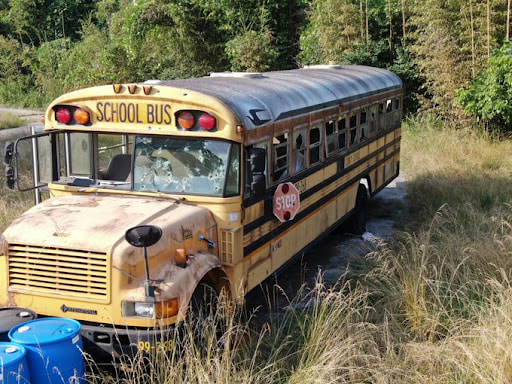 Land Defenders posted this image on Instagram, via @defendATLforest, with the caption: “Atlanta Police have a school bus that cops shoot up at their firing range. This is the existing basis for #CopCity. Neighboring children in surrounding Dekalb County are subjected to hearing daily rapid gunfire and even explosions from the APD range.” In the early 1800s, the land was stolen from Creek and Cherokee peoples, then turned into the site of a cruel prison plantation where inmates were forced to do unpaid agricultural labor (Garrison). The ongoing expansion of a policing empire here means developing further disdainful techniques to suppress civilian action under a surveillance state. Every day that passes, the police are defending the privatization of public and essential forests while the planet burns. The centuries-long struggle for indigenous land rights is one and the same with the fight against the degradation of wilderness that breathes life into this world. From the Zapatista struggle in Mexico, The Mapuche struggle in Chile, the fight against Line 3 on Anishinaabe lands, the resistance goes on. Support Land defenders at defendtheatlantaforest.com 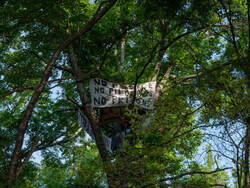 Photo by David Walter Banks/The Guardian Cited: Adam Mahoney, “To Residents, Razing Atlanta Forest for ‘Cop City’ project is ‘an Act of Disinvestment” https://atlanta.capitalbnews.org/atlanta-cop-city-climate-change/ Tim Alan Garrison, Cherokee removal https://www.georgiaencyclopedia.org/articles/history-archaeology/cherokee-removal/ 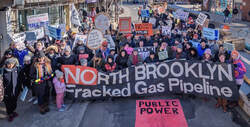 Last summer I attended a poetry reading at Brooklyn's annual LUNG Festival in one of their many beautiful gardens. After the poets read their poems, there was a lady there named JK who was talking about a fracked gas pipeline that was being built in only global majority communities (specifically Black and Latinx communities) in Brooklyn. Being of Asian descent it really hurt me hearing how racist it was that a company was building something so detrimental not only to the environment, but to the communities they are building it through. Then I heard that the company building it was National Grid, which hurt me even more since my mom works for them. There was definitely an internal battle in my mind whether I should join or not since my mom works for them, but JK said something that shut down that internal battle in my head which was, “We have to fight for mother nature because she can’t fight for herself” and that opened my eyes to what I truly care about which is mother Earth. I then told JK that I would love to join their protest group and help out as much as I could, so she invited me to their protest group chat on signal and that is how my protest journey began. National Grid’s seven mile high pressure fracked gas transmission pipeline is being built through predominantly Black and Latinx communities including Brownsville, Ocean Hill, Bushwick, and East Williamsburg. Not only is this pipeline racist, but it’s also extremely dangerous to the health of the people who live in these areas. The pipeline endangers the air, surface waters, health and safety of the people. National grid not only doesn’t care for the health and safety of these communities, but according to Amy Paul’s article New Discrimination Complaint Accuses National Grid of Bypassing Safety Laws for Brooklyn Pipeline they “didn’t follow the required procedures to meaningfully notify or educate the public about the pipeline or its risks or safety precautions, failed to perform required pressure tests and submit critical information about the pipeline route to state and federal regulators, never conducted an environmental analysis of the pipeline’s harms to the surrounding community, despite applying for discretionary permits to expand its LNG facility and to dump millions of gallons of wastewater into New York City’s Sewers, and did not seek or obtain the approval of the New York City Council for the pipeline route, as required by state law." 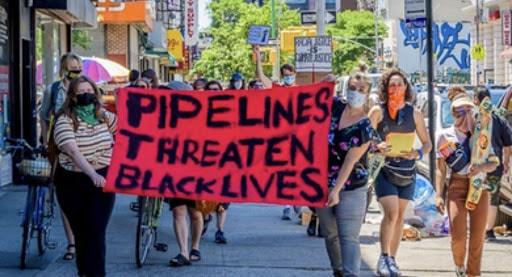 The first event I went to with the No NBK group was handing out flyers to people at the Atlantic Antic Street Fair. There were many people who were interested in striking and not paying the additional price National Grid is adding to their gas bill to create the pipeline. Also, many people that were living in the areas were unaware this was even happening! The second event I went to was a noise march where we were playing instruments around the neighborhood, chanting protest slogans, and holding up signs. We marched to one of National Grid’s pipeline locations and chanted outside. Being a part of this protest group has changed my life and environmental awareness. 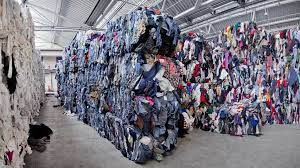 In the Sixth Street Community Center we learned about a lot of important current events, but what was the most interesting and personal to me was the crisis in the fast fashion industry. According to an article from the Fair Trade Certified website, the fast fashion industry is made up of 80% women. They work 10-15 hours a day, and only earn 60-70% of men's wages. This industry abuses and exploits innocent workers, to produce mass amounts of cheap clothes for uninformed people to wear. Due to a rapidly changing fashion industry, new trends, and increasing numbers of consumers, there is a high demand for “trendy” new clothes. Micro-trends are a major issue that leads to the overproduction of cheap clothing. Especially nowadays, because of social media and different types of advertisements, what is considered “trendy” changes very often, and clothing companies have to keep up with demand. These trends come and go in the span of months, creating a lot of waste. Most popular major companies, such as Shein, Brandy Melville, Forever 21, Zara, and more, contribute to fast fashion and are able to continue the cycle because they have a lot of customers.  People buy fast fashion for a multitude of reasons. Fast fashion is cheap and easily accessible but it is extremely harmful to the environment and directly contributes to climate change in many ways. For example, it uses a lot of textile dyes that leak into the oceans. These dyes are actually the second-largest water pollutant globally. These pollutants and dyes are harmful to ocean animals, farmers, and workers. In addition, clothes made by big, capitalist, and inhumane companies use cheap fabrics that contain microplastics, which are non-biodegradable and contribute to a whole other issue of plastic in the environment. Not only that, but fast fashion is responsible for a whopping 10% of humanity's carbon emissions, more than all international flights, and maritime shopping. The intriguing harm of fast fashion is important to me because I used to be a consumer of this industry before I knew how harmful it was. I was like most people, and bought whatever, just because it was cute, without knowing that every dollar I spent was supporting and encouraging these major companies, and in turn, hurting the environment. But after learning a lot more about clothing and how such mass amounts are made in order to keep up with such high demand, I have tried to be more aware of what I buy. Although you can’t un-buy things, there are many alternatives to buying from major companies. Thrifting is a great option that is also very affordable and charitable. By buying used clothes, it limits the need for such great unethical production of clothes, and gives a new home to clothes that someone may have just grown out of, rather than it contributing to the already mass amounts of waste we have. Another alternative can simply be hand-me-downs, reusing clothes, (ex. Your parents’), which is very harmless and easy to find some super cute stuff! You can also buy from various environmentally friendly brands, many of which are listed in the zine I worked on. These smaller brands are typically more expensive because they require higher-end materials, in order to avoid the dangers of fast fashion. But, if you are able to afford it, it is a great option. I am grateful that I have been able to learn so much about this topic, and hope to educate others. 6/22/2022 1 Comment Pollution: by Lola W |
|
Sixth Street Community Center
638 E 6th Street between Aves B & C • (212)-677-1863 |
© 2014 Sixth Street Community Center. All rights reserved. |
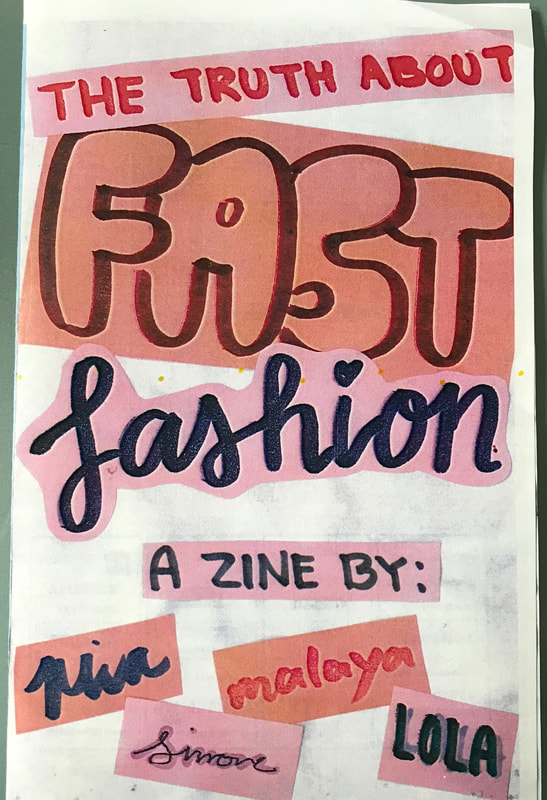
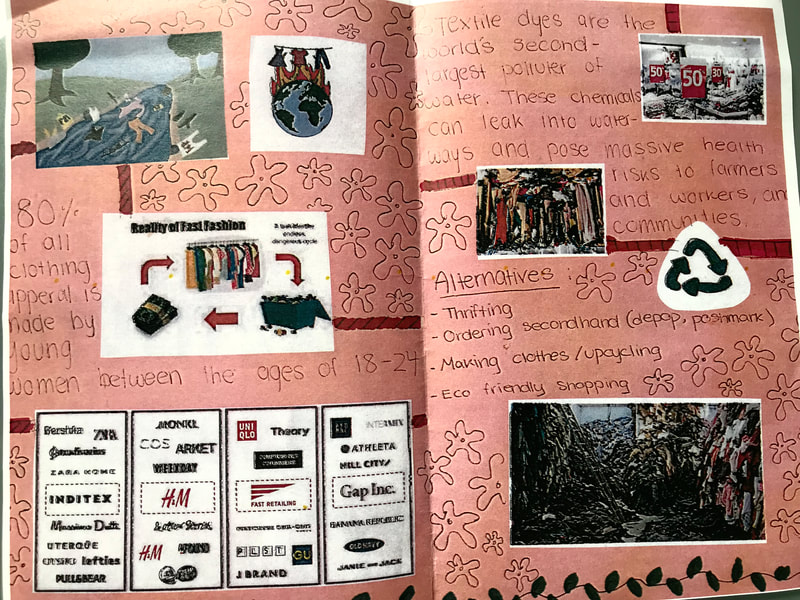
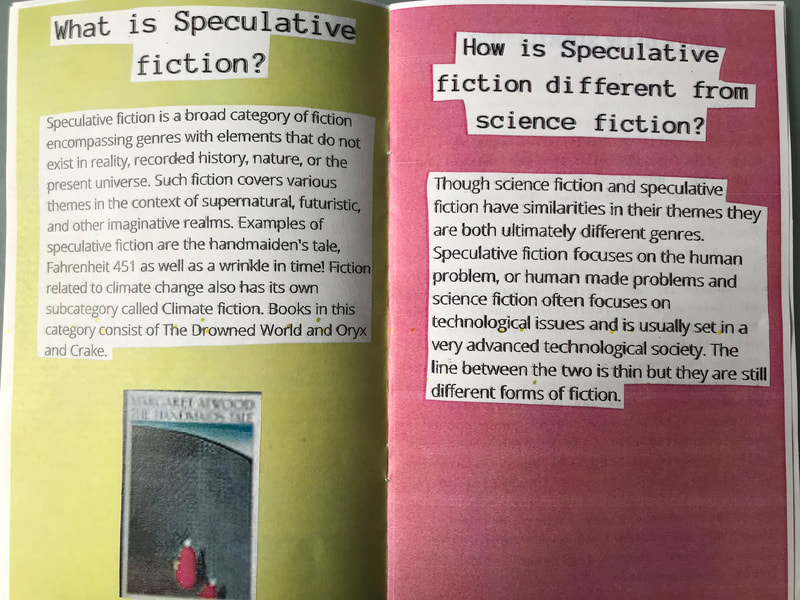
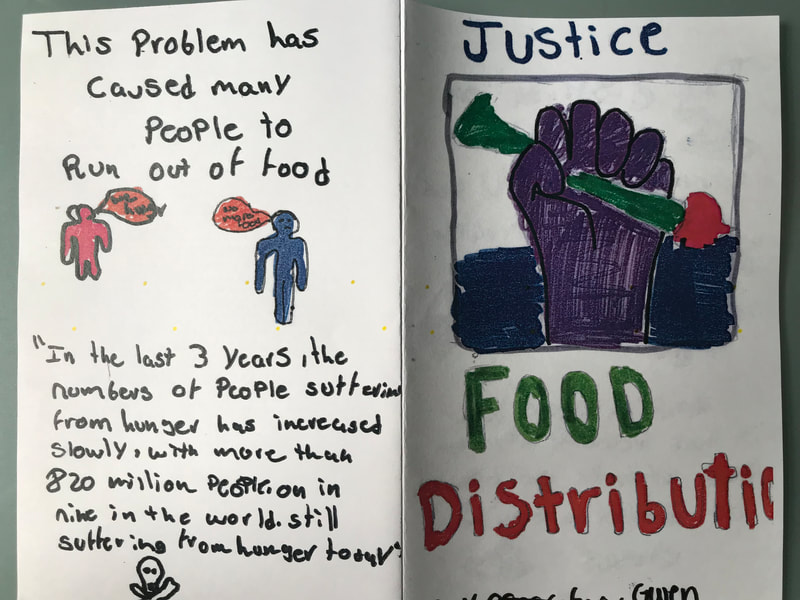
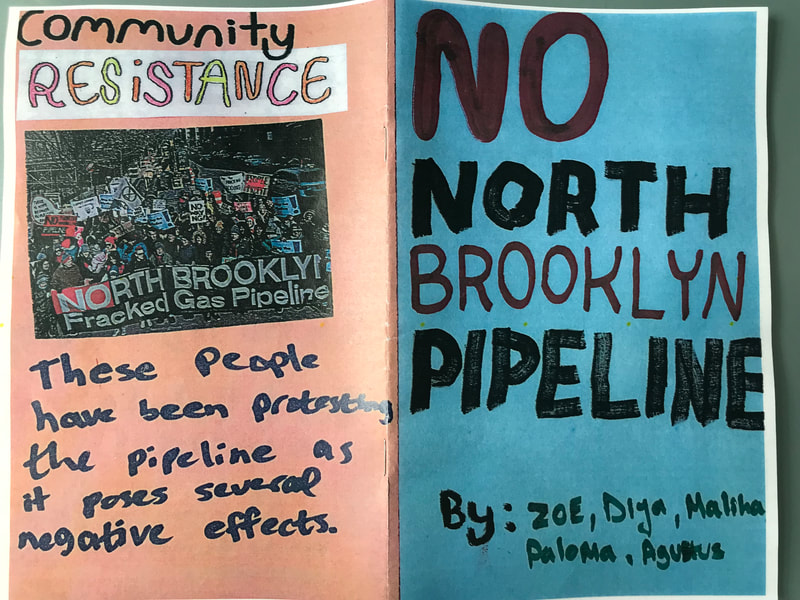
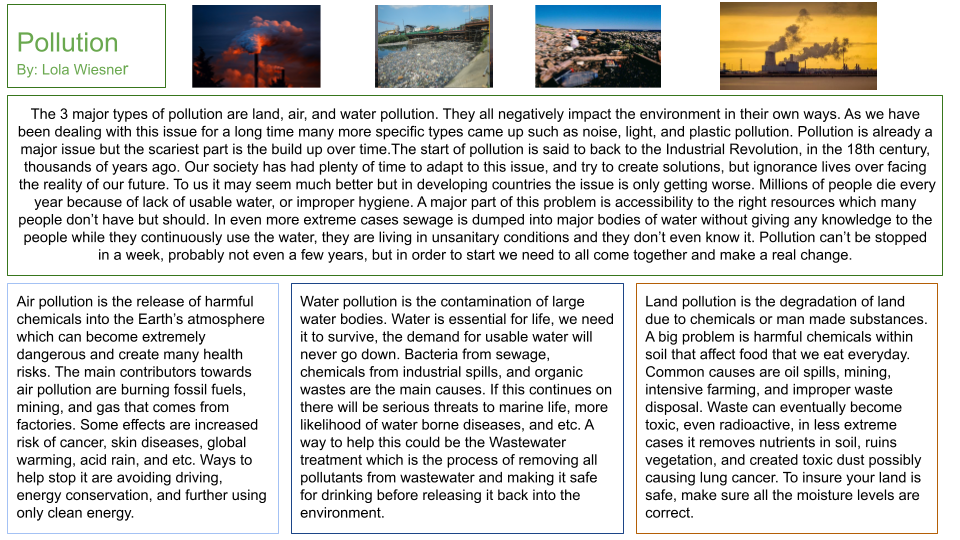
 RSS Feed
RSS Feed